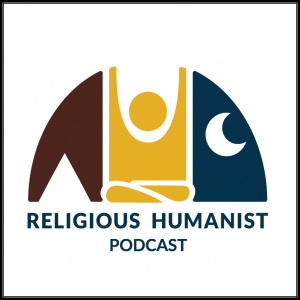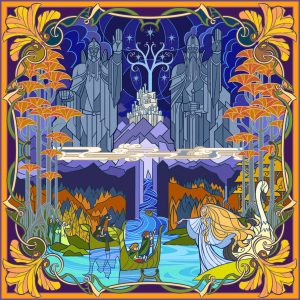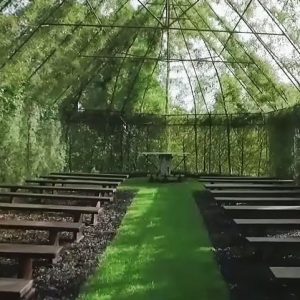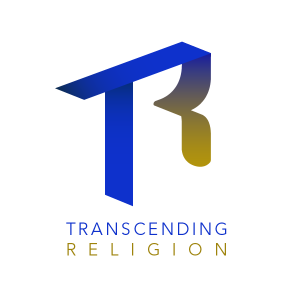When I close my eyes, I can see a campus, somewhere in the mountains of Utah. A seminary. A Religious Humanist seminary, where clergy are trained to help people become the best humans they can be. There is a central building for teaching and administration (I am not ashamed to admit I imagine it looking like the X-Men mansion), and then three cathedrals in a triangle: Life cathedral, Earth Cathedral, Geek Cathedral. These programs and cathedrals would allow for full-scale implementation of Religious Humanist congregations.
I am dedicating my life to fixing religion. Easy enough, right?
But the great thing is, I don’t need to see these cathedrals built for Religious Humanism to be successful (though I hope to!). Religious Humanism is immediately worthwhile because each stage of development is independently valuable and worthy of investment. In addition, each stage leads to the next. So even as Religious Humanism develops, it improves lives and religion along the way.
Religious Humanism in concept
The Religious Humanism forums will be our primary “research and development” tool to crowdsource and refine the details of each approach to improve quality of life through religion done better.
Have you ever wanted to hear a hymn to your favorite superhero? Or would like to know which parts of Harry Potter best illustrate the virtue of loyalty?
Together we can figure out which hundred humans in history have done the most good for the world. And highlight the Humanist prophets solving the world’s problems through activism and innovation.
On the forums users will answer many questions such as these, as well contribute original content such as art and hymns. The Religious Humanist Wiki will then maintain the most updated versions of all these facets of religion done better, thus allowing for immediate life application.
On this blog I will explore issues relating to Religious Humanism, including modeling sermons and spotlighting extraordinary humans who are making the world a better place. The recommended resources will allow you to learn about the history and science related to human nature, religion, and the powerful intersection of the two.
This collaboration will facilitate the production of high quality online content.
Religious Humanism online
Podcasts, online resources, and a sophisticated interactive experience (including “Multiplayer Online Religion”!) will allow you to experience virtual Religious Humanism that carries a real world impact.
Podcasts
Mormon Sunday School
 For the past four years I have taught LDS Sunday School in a way that benefits a broad spectrum of listeners, from literal believers to atheists. Functionally, this podcast delivers Humanism and social science informed well-being expressed in Mormon language. It thus provides a thorough example of my Religion Better Than True approach.
For the past four years I have taught LDS Sunday School in a way that benefits a broad spectrum of listeners, from literal believers to atheists. Functionally, this podcast delivers Humanism and social science informed well-being expressed in Mormon language. It thus provides a thorough example of my Religion Better Than True approach.Humanist Home Evening
 Throughout 2017 I will issue weekly episodes that explore well-being within a family or intimate group setting. If you crave community, family is the first place to go, whether you are fortunate to have been born into a loving family or whether you have created a few family of choice. Humanist Home Evening will model the uses of narrative and ritual to foster individual and group identity, celebrate history and the calendar year, and teach life skills that are too often overlooked in our culture.
Throughout 2017 I will issue weekly episodes that explore well-being within a family or intimate group setting. If you crave community, family is the first place to go, whether you are fortunate to have been born into a loving family or whether you have created a few family of choice. Humanist Home Evening will model the uses of narrative and ritual to foster individual and group identity, celebrate history and the calendar year, and teach life skills that are too often overlooked in our culture.Religious Humanist Podcast
The Religious Humanist Podcast will consist of 20-30 minute high quality episodes released weekly, with the following rotation of episodes: 

- Sermons: Humanist sermons teaching life-skills and drawing illustrations from science and culture;
- History: Interviews that explore the history of religion and related topics;
- Science: Interviews on the science of religion and religious experience;
- Scripture: Literary reviews of books and other media focusing on how they can inspire and motivate, thus functioning as scripture; and
- Prophets: Spotlighting of activists who are making the world better in innovative, sustainable ways–our generation’s prophets.
Websites
Olam Institute
Olam Institute is the site our 501(c)(3) non-profit, through which we work to nurture constructive approaches to religion.
 Religious Humanism
Religious Humanism
You are here. As noted above, on this site we will work together to better religion and increase well-being by developing and refining Religious Humanism.
Transcending Religion
There will be three portals:
Past. This section will illuminate the co-evolution of religion and human nature. You will learn where religion comes from and how it has developed over time, as well as why humans are both profoundly limited but transcend those limitations in specific contexts.
Present. This section will encourage you to explore religion in your own life and the world. Are you happy? Why or why not? How could best elements of religion improve your life? Who is religious in the world? Where is religion increasing and decreasing, and why? What causes the mismatch between our evolution and the modern world, and what can we do about it?
Future. This section will allow you to experience the three approaches of Religious Humanism.
Religion Better Than True
I’ve heard that people like to argue on the internet, and here that tendency is harnessed for good. Imagine that for each religious denomination, a sympathetic atheist former member and a literal believer had to agree on their religion. The non-believer would keep the religion defensibly beneficial, while the believer would keep it recognizable to fellow active members. Here you will be able to review these “best forms” of existing religious denominations, as honed over years on the forums.
Spiritual Training Regimen
 Here you will be able to tap into your best self and connect with like minded individuals. After a thorough personality test helps you determine a fitting approach to religion, you will be invited to discover the texts, music, spaces, and rituals that most inspire and motivate you. You will be invited to articulate the vows and practices to discipline yourself for maximal well-being. You will also be able to follow your friends’ spiritual quests, and be connected to those inspired by similar approaches to yours.
Here you will be able to tap into your best self and connect with like minded individuals. After a thorough personality test helps you determine a fitting approach to religion, you will be invited to discover the texts, music, spaces, and rituals that most inspire and motivate you. You will be invited to articulate the vows and practices to discipline yourself for maximal well-being. You will also be able to follow your friends’ spiritual quests, and be connected to those inspired by similar approaches to yours.Religious Humanist Denominations
 In my opinion this will be the most exciting part of the site, where you will have the opportunity to virtually visit the cathedrals of Life, Earth, and Geek Church. Create your avatar. Dress in your worship clothing. Pick up a copy of the Life, Earth, or Geek Bible. Walk into the cathedral, gazing at the architecture and stained glass windows. Listen to a sermon or hymns, on your own or with friends. All details will be true to life and will provide models for real world equivalents.
In my opinion this will be the most exciting part of the site, where you will have the opportunity to virtually visit the cathedrals of Life, Earth, and Geek Church. Create your avatar. Dress in your worship clothing. Pick up a copy of the Life, Earth, or Geek Bible. Walk into the cathedral, gazing at the architecture and stained glass windows. Listen to a sermon or hymns, on your own or with friends. All details will be true to life and will provide models for real world equivalents.Religious Humanism in the world
All previous aspects of Religious Humanism will allow for immediate real-world application. Want to design your own Spiritual Training Regimen right now? Or have a Geekist gathering? Go for it, and the Wiki, podcasts, and other resources will help you. You don’t need to wait around for organized congregations.
But those congregations will come. I aim to have my own congregation in place by 2025, likely in the Salt Lake area. In preparation for this I will have put myself through the first Religious Humanist Master’s of Divinity program (as part of a rigorous ordination process that will include professional clergy training). I also plan use the privileges of religious education to collaborate on a K-12 Religious Humanist school program.
My dream is to establish the seminary I mentioned at the beginning of this post. Here I and other ministers will teach and preach Religious Humanism. Worship services will take place in inspiring cathedrals. This structure will provide a powerful nexus to nurture thriving and address urgent problems in the world.
 Religious Humanism will have truly succeeded when children are being raised within self-sustaining congregations. It will then be a living religion. Communities will be able to decide whether they want to establish a Life, Earth, or Geek cathedral. Because most locations will not be able to sustain more than one denomination, Life Cathedrals will contain sanctuaries for both Earthist and Geekist worship.
Religious Humanism will have truly succeeded when children are being raised within self-sustaining congregations. It will then be a living religion. Communities will be able to decide whether they want to establish a Life, Earth, or Geek cathedral. Because most locations will not be able to sustain more than one denomination, Life Cathedrals will contain sanctuaries for both Earthist and Geekist worship.Once Religious Humanist congregations thrive, they will provide examples of what the future of religion could be, while making life and even the world better in the interim.



how do you define/describe your three “Life cathedral, Earth Cathedral, Geek Cathedral”?
thanks.
hilmar
ok, you defined your “churches” somewhat better here: https://youtu.be/9_MXrs7qN4U . but shouldn’t be there a written, more detailled definition here?
and another question: don’t think that most religious communities would kick you out (if not worse) with your goal of making them better? isn’t religion very much about having unshakeable (! – that is safe and certain!) beliefs/tenets and about being in some sort of covenant with the most powerful might(s) in the ‘universe’ so you can feel empowered and ultimately good = redeemed about yourself and what you are doing? and is this essential point of religion not exactly what prevents adherents from becoming better, that is being open for problems, criticism, flexible, scientific and technologically creative thinking, peaceful interaction with non-believers, respect and care for the environment = ‘this world’ (religion being mostly about subjugating and/or dismissing it, because ‘ultimately’ only the imagined transcendent world shall count…)?
still I agree with your goal of maintaining important parts of “the cultural technology” called religion (like sacred spaces, rituals and ritualized communal gatherings…) but which ones? and how to get rid of the dangerous, deleterious ones??
I appreciate your thoughtful comments!
1) These posts are evocative and succinct more than exhaustive. They are intended to get you thinking. Thanks for linking to my other discussion!
2) You get at the heart of one of the core issues with religion… religion mostly works because people don’t realize how religion works!! There are multiple ways around this issue, such as collaborating with trusted insiders. As you know from my other work, I think that the best target is to describe improving religion in a way that literal believers would embrace. Commentary is an effective way to emphasize the best parts of a religion and tempering the damaging aspects.
3) This is why subversion is defensible and perhaps even needed… we need to make improvements in a way that most people will remain unaware of. If done right, the religion just feels better and “truer” and they don’t know what is going on under the hood. I’m unapologetically supportive of using subversion to increase well-being.
4) I think the best practical target is to make all religions the best versions of themselves. Ideally increasing the health of religions globally would trigger the evolutionary process of the worst ones dying out… but the problem is that the “worst ones” are often the same ones that most powerfully push all the human buttons, so they are likely to persist.